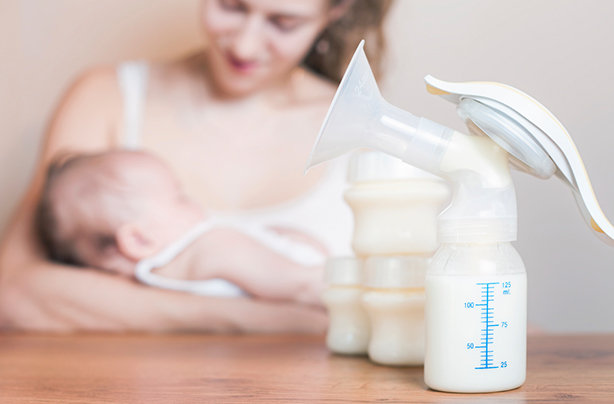Insufficient breastfeeding: What you need to know
'The mother should not feel any sense of failure or guilt'

Parenting advice, hot topics, best buys and family finance tips delivered straight to your inbox.
You are now subscribed
Your newsletter sign-up was successful
Breastfeeding can be an overwhelming experience for any new mum.
The NHS states that the frequency with which a baby feeds can vary, explaining: 'It's fine to feed your baby whenever they are hungry, when your breasts feel full or if you just want to have a cuddle. It's not possible to overfeed a breastfed baby.'
However, while it may not be possible to overfeed, many women worry that their baby is not getting enough milk through breastfeeding, and are unsure when they need to supplement their own milk with a bottle.

Here, breastfeeding expert Clare Byam-Cook explains what insufficient breastfeeding means, what you can do to help, and why you shouldn't feel any sense of failure if you need to switch to formula...
'If feeding is going well, you should feel totally confident to stick with exclusive breastfeeding,' Clare advises. 'But if your baby is clearly not getting enough milk you should not feel any sense of failure or guilt if you need to give your baby a bottle.'
'A breast pump will enable you to see whether you can put your own milk in the bottle or whether your supply is so low that you need to give formula.'
A baby is getting plenty of colostrum and/or milk if:
- Their sucking is deep and rhythmic
- They fall asleep at the breast and stay asleep when put into their own bed
- The feed lasts them roughly two to four hours before they wake up and want to feed again
- They have a wet nappy at most feeds and do not lose more than 10% of their birth weight within the first four days
- They start re-gaining weight after about day four
A baby is not feeding well if:
- They are doing shallow 'dummy' type sucking on the breast
- They keep crying for a feed but then fall asleep after only a few sucks at the breast
- They wake up and start crying every time you try to settle them in their own bed
- They only stop crying when you cuddle them and/or take them into bed with you
- They are feeding for hours on end but never seems satisfied
- They are not passing much urine
A baby is becoming severely underfed and dehydrated if:
- They go more than six hours without passing urine
- Their urine is concentrated and smelly
- Their mouth and lips are dry
- Tiny orange or pink crystals (urates) appear in their nappy
- They become very drowsy and hard to wake
'At this point it is essential to give them some milk from a bottle,' Claire says. 'Newborn and infant starvation from insufficient exclusive breastfeeding occurs when the baby gets so little milk out of the breast that the lack of calories and fluid causes them to lose excessive weight and become severely dehydrated.'
Parenting advice, hot topics, best buys and family finance tips delivered straight to your inbox.

Clare explains that breastfeeding often goes wrong because mothers are taught in their antenatal classes that breastfeeding is natural and therefore everyone can do it.
'This isn't true,' she says. 'Lots of mothers suffer from a low milk supply and many babies can't or won't suck well enough on the breast to get a full feed. This happens in the animal world as well - not all dairy cows are good milk producers and many newborn animals (e.g. lambs) need to be bottle fed to keep them alive. Mothers and babies are the same.'
'Mothers are not taught how to tell the difference between good sucking and bad sucking and many of the health professionals can't judge either, which is why so many babies get readmitted to hospital suffering from severe dehydration and weight loss.'
She also warns against common myths that can falsely make mothers believe that their baby is eating enough.
'Having a 'great latch' isn't always relevant,' she details. 'A baby can be latched on really well, but they still won't get a good feed if the mother doesn't have enough milk.'
'Mums frequently get told that 'cluster feeding' (where babies feed close together at certain times of the day) is normal, but sometimes the reality is that cluster feeding is a clear indication that the baby is not getting enough milk. If they were getting a full feed it would be a meal that lasts them several hours, rather than only a few minutes.'
Ultimately, Clare adds, it doesn't matter why the mother doesn't have enough milk, the question is can anything be done about it?
'If not, the baby should be given some formula milk,' she says. 'It is not liquid poison.'
Trusted, informative, and empathetic – GoodToKnow is the ultimate online destination for parents. At GoodtoKnow, our mission is 'simple': we're trying to make sense of parenthood. On the site, you'll find everything you need for a happy, healthy family life. Our huge archive of content includes more than 18,000 articles and 1,500 how-to videos. These include expert-backed advice features on parenting, dealing with relationship changes after having a baby, self-care for mums and managing your family finances. We also feature tried-and-tested product reviews and buying recommendations for every stage of family life - from prams and Moses baskets to birthday gifts and top toys.